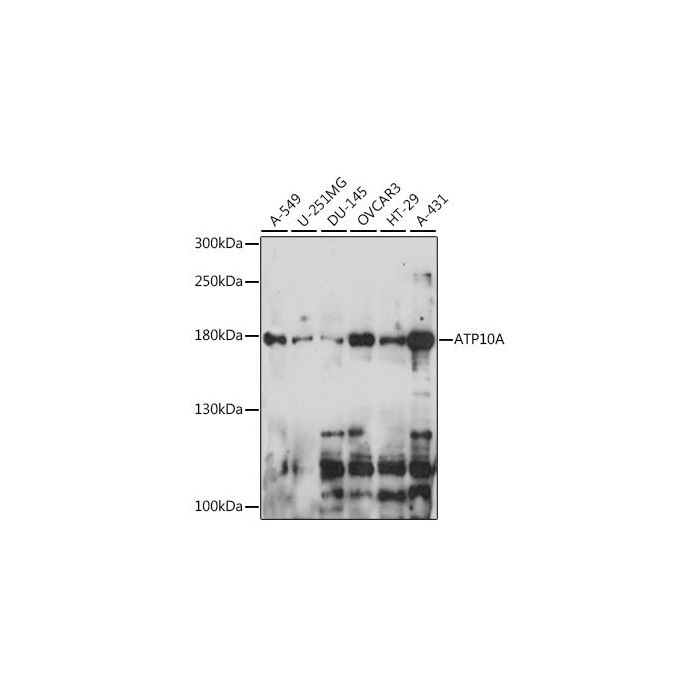ATP10A polyclonal, anti-human
€388.00
In stock
SKU
BS72791
Background:
The protein encoded by this gene belongs to the family of P-type cation transport ATPases, and to the subfamily of aminophospholipid-transporting ATPases. The aminophospholipid translocases transport phosphatidylserine and phosphatidylethanolamine from one side of a bilayer to another. This gene is maternally expressed. It maps within the most common interval of deletion responsible for Angelman syndrome, also known as 'happy puppet syndrome'.
Alternative Name:
ATP10C,ATPVA,ATPVC
Application Dilution: WB: 1:500 - 1:2000
Specificity: ATP10A polyclonal antibody detects endogenous levels of ATP10A protein.
Immunogen:
Recombinant protein of human ATP10A
MW: 170kDa
Swis Prot.: O60312
Purification & Purity:
The antibody was affinity-purified from rabbit antiserum by affinity-chromatography using epitope-specific immunogen and the purity is > 95% (by SDS-PAGE).
Format:
1mg/ml in PBS, 50% glycerol, pH7.3.
Storage:
Store at 4°C short term. Aliquot and store at -20°C long term. Avoid freeze-thaw cycles.
For research use only, not for use in diagnostic procedure.
The protein encoded by this gene belongs to the family of P-type cation transport ATPases, and to the subfamily of aminophospholipid-transporting ATPases. The aminophospholipid translocases transport phosphatidylserine and phosphatidylethanolamine from one side of a bilayer to another. This gene is maternally expressed. It maps within the most common interval of deletion responsible for Angelman syndrome, also known as 'happy puppet syndrome'.
Alternative Name:
ATP10C,ATPVA,ATPVC
Application Dilution: WB: 1:500 - 1:2000
Specificity: ATP10A polyclonal antibody detects endogenous levels of ATP10A protein.
Immunogen:
Recombinant protein of human ATP10A
MW: 170kDa
Swis Prot.: O60312
Purification & Purity:
The antibody was affinity-purified from rabbit antiserum by affinity-chromatography using epitope-specific immunogen and the purity is > 95% (by SDS-PAGE).
Format:
1mg/ml in PBS, 50% glycerol, pH7.3.
Storage:
Store at 4°C short term. Aliquot and store at -20°C long term. Avoid freeze-thaw cycles.
For research use only, not for use in diagnostic procedure.
| Is Featured? | No |
|---|
Write Your Own Review

